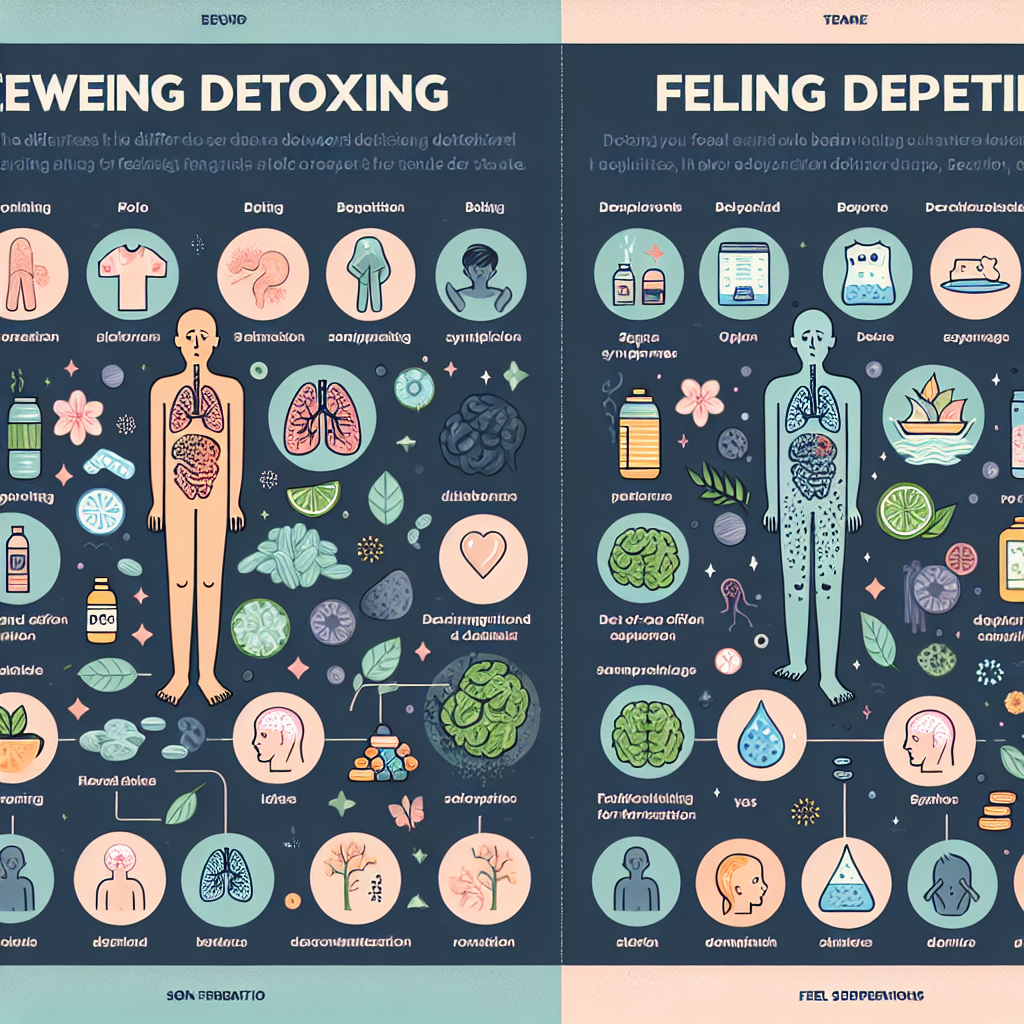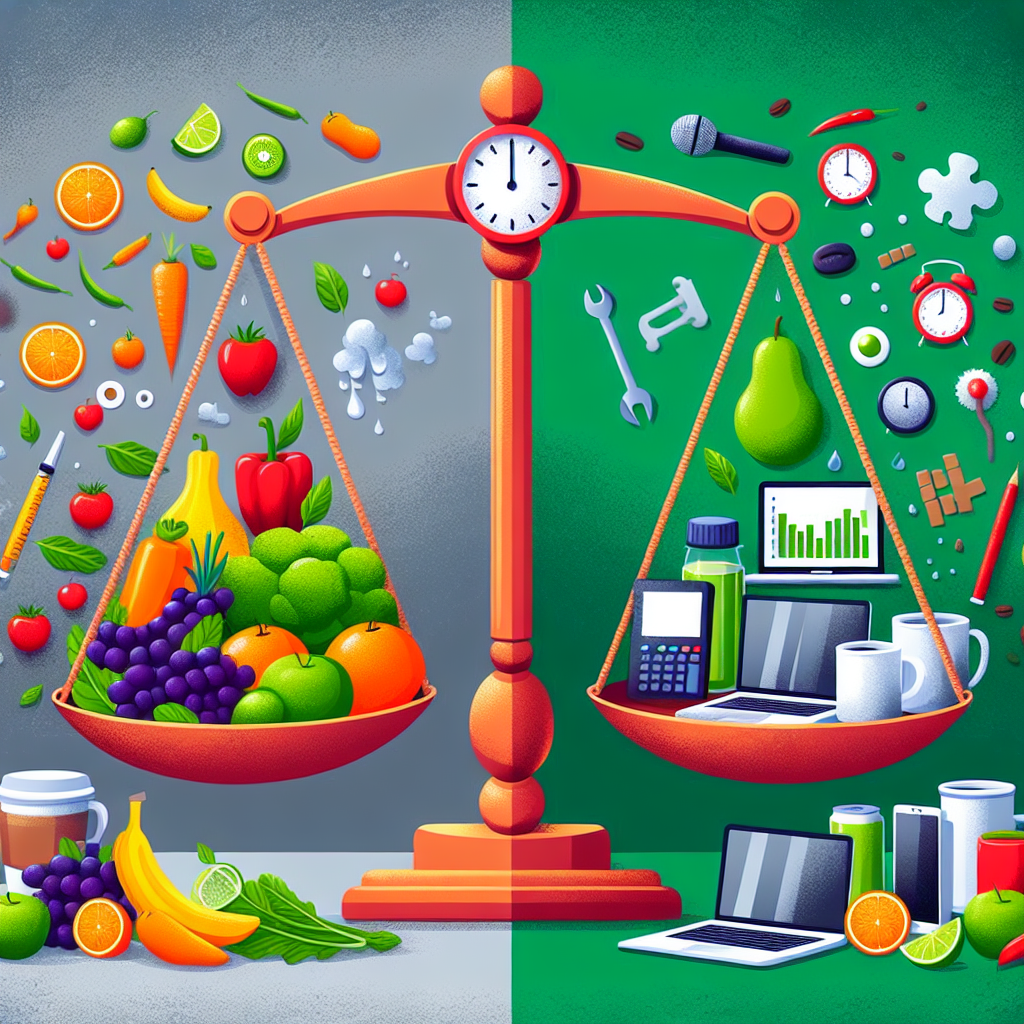How to Tell If You’re Detoxing or Just Depleted

Discover the difference between detoxing and depletion. Learn how to identify the signs and take control of your health. Visit My Vibrant Vitality now.
Signs You’re Detoxing or Simply Depleted: Understanding the Difference
Detoxification is a natural process that the body undergoes to rid itself of harmful substances. It’s a vital function that keeps us healthy and functioning optimally. However, sometimes, the symptoms of detoxification can be mistaken for signs of depletion, a state where the body lacks the necessary nutrients it needs to function properly. Understanding the difference between these two states is crucial for maintaining good health.
When you’re detoxing, your body is actively working to eliminate toxins. This process can cause a variety of symptoms, including headaches, fatigue, skin breakouts, and digestive issues. These symptoms are often temporary and subside once the detoxification process is complete. They are the body’s way of signaling that it’s working hard to cleanse itself.
On the other hand, if you’re feeling depleted, the symptoms may be similar but the underlying cause is different. Depletion occurs when your body is lacking in essential nutrients, either due to poor diet, stress, or illness. Symptoms of depletion can include fatigue, weakness, difficulty concentrating, and a weakened immune system. Unlike detoxing, these symptoms won’t simply disappear once the body has rid itself of toxins. Instead, they will persist until the body receives the nutrients it needs.
So, how can you tell if you’re detoxing or just depleted? The key lies in understanding your body and paying attention to the signals it’s sending. If you’ve recently started a detox regimen or made significant changes to your diet, the symptoms you’re experiencing are likely due to detoxification. These symptoms should gradually decrease as your body adjusts to the changes.
However, if you’ve been feeling unwell for a prolonged period without any significant changes to your diet or lifestyle, you may be dealing with depletion. This is especially likely if you’re experiencing symptoms like persistent fatigue, difficulty concentrating, or frequent illness. These are signs that your body is not receiving the nutrients it needs to function properly.
In both cases, it’s important to listen to your body and give it what it needs. If you’re detoxing, make sure to stay hydrated and get plenty of rest to help your body through the process. If you’re depleted, focus on improving your diet and consider taking supplements to ensure you’re getting the necessary nutrients.
It’s also crucial to consult with a healthcare professional if you’re unsure about what your body is telling you. They can provide guidance and help you determine whether you’re detoxing or depleted. Remember, while detoxing can be beneficial, it’s not a substitute for a balanced diet and a healthy lifestyle. Similarly, if you’re feeling depleted, it’s important to address the underlying issues and not just treat the symptoms.
In conclusion, understanding the difference between detoxing and depletion is essential for maintaining good health. By paying attention to your body and providing it with what it needs, you can ensure that you’re supporting your body’s natural detoxification processes and preventing nutrient depletion. Whether you’re detoxing or depleted, remember that your health is a journey, not a destination. It’s about making consistent, positive choices that support your overall well-being.
Deciphering Detox Symptoms from Depletion: A Comprehensive Guide

In the pursuit of optimal health, many individuals turn to detoxification methods to cleanse their bodies of harmful toxins. However, it’s crucial to understand the difference between the symptoms of detoxification and those of depletion. This comprehensive guide will help you decipher whether you’re detoxing or just depleted.
Detoxification is a natural process that the body undergoes to eliminate or neutralize toxins. This process can be enhanced through various methods such as fasting, dieting, or using specific detox aids. During detoxification, it’s common to experience symptoms such as headaches, fatigue, skin breakouts, or changes in bowel movements. These symptoms are often a sign that your body is effectively eliminating toxins.
On the other hand, depletion refers to a state where your body lacks essential nutrients, leading to various health issues. Symptoms of depletion can be similar to those of detoxification, making it challenging to distinguish between the two. However, there are subtle differences that can help you identify whether you’re detoxing or depleted.
One of the key differences lies in the duration of the symptoms. Detox symptoms are typically short-lived, lasting a few days to a week as your body adjusts to the detox process. If you’re experiencing symptoms such as fatigue, headaches, or digestive issues for an extended period, it may be a sign of depletion rather than detoxification.
Another distinguishing factor is the intensity of the symptoms. While detox symptoms can be uncomfortable, they are usually mild and manageable. However, if you’re feeling extremely fatigued, experiencing severe headaches, or having significant digestive issues, it could indicate that your body is depleted of essential nutrients.
Moreover, if you’re following a detox plan but not seeing any improvement in your symptoms, or if they’re getting worse, it’s likely that you’re dealing with depletion. In such cases, it’s crucial to seek medical advice as prolonged nutrient deficiency can lead to serious health complications.
It’s also important to consider your diet and lifestyle. If you’re eating a balanced diet rich in fruits, vegetables, lean proteins, and whole grains, and you’re still experiencing symptoms, it’s more likely that you’re detoxing. However, if your diet lacks essential nutrients, or if you’re under a lot of stress, the chances are high that you’re depleted.
In conclusion, while detoxification is a beneficial process for your body, it’s essential to ensure that you’re not mistaking symptoms of depletion for those of detox. Paying attention to the duration, intensity, and progression of your symptoms, as well as considering your diet and lifestyle, can help you distinguish between the two. If you suspect that you’re depleted, it’s crucial to seek medical advice to address the issue promptly. Remember, achieving optimal health is a balance between eliminating toxins and ensuring your body has the nutrients it needs to function effectively.
Detox or Depletion? How to Identify What Your Body is Telling You
Detoxification is a natural process that the body undergoes to rid itself of harmful substances. It is a vital function of the liver and kidneys, and it can be enhanced through certain diets and lifestyle changes. However, the symptoms of detoxification can sometimes be confused with those of depletion, a state in which the body lacks essential nutrients. Understanding the difference between these two states is crucial for maintaining optimal health.
Detoxification often manifests as a series of physical symptoms that can be uncomfortable but are generally a sign that the body is effectively eliminating toxins. These symptoms may include headaches, fatigue, skin breakouts, and digestive issues. These are often temporary and should subside as the body adjusts to the detoxification process. However, if these symptoms persist or become severe, it may be a sign that the body is not detoxing but is instead experiencing depletion.
Depletion, on the other hand, is a state of nutrient deficiency. It can occur when the body is not receiving enough essential nutrients from the diet, or when it is unable to absorb these nutrients effectively. Symptoms of depletion can be similar to those of detoxification, including fatigue and digestive issues. However, depletion may also cause more severe symptoms such as muscle weakness, dizziness, and rapid weight loss. If you are experiencing these symptoms, it is important to seek medical advice as they may indicate a serious health issue.
So, how can you tell if you’re detoxing or just depleted? The key is to listen to your body and pay attention to the duration and severity of your symptoms. If you’ve recently made changes to your diet or lifestyle to enhance detoxification, it’s likely that any discomfort you’re experiencing is a result of this process. However, if your symptoms persist for more than a few days or are accompanied by more severe symptoms such as muscle weakness or dizziness, it may be a sign of depletion.
In addition to monitoring your symptoms, it’s also important to consider your diet and lifestyle. If you’re consuming a balanced diet rich in fruits, vegetables, lean proteins, and whole grains, it’s likely that your body is receiving the nutrients it needs to function properly. However, if your diet is lacking in these essential nutrients, or if you’re engaging in strenuous physical activity without consuming enough calories, you may be at risk of depletion.
In conclusion, while detoxification and depletion can present similar symptoms, they are fundamentally different processes. Detoxification is a natural process that the body undergoes to eliminate toxins, while depletion is a state of nutrient deficiency that can have serious health consequences. By paying attention to your symptoms and considering your diet and lifestyle, you can determine whether you’re detoxing or just depleted. If you’re unsure, it’s always best to seek medical advice. Remember, your health is your wealth, and understanding what your body is telling you is the first step towards maintaining optimal health.